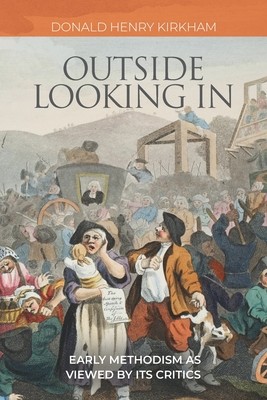
- We will send in 10–14 business days.
- Author: Donald Henry Kirkham
- Publisher: New Room Books
- ISBN-10: 194593543X
- ISBN-13: 9781945935435
- Format: 15.2 x 22.9 x 2.1 cm, softcover
- Language: English
- SAVE -10% with code: EXTRA
Reviews
Description
This book examines eighteenth-century pamphlet attacks on early Methodism, which came from all sides--the episcopacy, clergy, other Christian groups, universities, Wesley's ex-preachers, ex-Methodist laity, the Calvinist branch of Methodism, and the secular community. For the most part, sympathetic sources have written the story of Methodism--letters, diaries, and journals of Methodist leaders. Although the opposition encountered by Methodism has been noted, many historians, repeating well-known quotations from a few anti-Methodist authors, have failed to appreciate the extent, nature, and reason for resistance to the movement. Anti-Methodist pamphlet attacks took place in the context of other forms of hostility: mob violence, antagonistic articles in newspapers and periodicals, criticism in novels and plays, and verbal assaults from pulpit and press.
Author Donald Henry Kirkham presents a nuanced view of the emergence of Methodism. His conviction is that a re-appraisal of works antagonistic to the movement and its principals offers a fresh perspective, even if distorted, and a needed corrective to the legend Wesley and his admirers created in the nineteenth and twentieth centuries.
The book references more than six hundred pamphlets and books published in Great Britain between 1739 and 1800 by opponents of the evangelical revival. The vast array of anti-Methodist literature represents, as Richard Heitzenrater has said, one of the most overlooked primary resources for the study of Methodism.
EXTRA 10 % discount with code: EXTRA
The promotion ends in 14d.00:32:35
The discount code is valid when purchasing from 10 €. Discounts do not stack.
- Author: Donald Henry Kirkham
- Publisher: New Room Books
- ISBN-10: 194593543X
- ISBN-13: 9781945935435
- Format: 15.2 x 22.9 x 2.1 cm, softcover
- Language: English English
This book examines eighteenth-century pamphlet attacks on early Methodism, which came from all sides--the episcopacy, clergy, other Christian groups, universities, Wesley's ex-preachers, ex-Methodist laity, the Calvinist branch of Methodism, and the secular community. For the most part, sympathetic sources have written the story of Methodism--letters, diaries, and journals of Methodist leaders. Although the opposition encountered by Methodism has been noted, many historians, repeating well-known quotations from a few anti-Methodist authors, have failed to appreciate the extent, nature, and reason for resistance to the movement. Anti-Methodist pamphlet attacks took place in the context of other forms of hostility: mob violence, antagonistic articles in newspapers and periodicals, criticism in novels and plays, and verbal assaults from pulpit and press.
Author Donald Henry Kirkham presents a nuanced view of the emergence of Methodism. His conviction is that a re-appraisal of works antagonistic to the movement and its principals offers a fresh perspective, even if distorted, and a needed corrective to the legend Wesley and his admirers created in the nineteenth and twentieth centuries.
The book references more than six hundred pamphlets and books published in Great Britain between 1739 and 1800 by opponents of the evangelical revival. The vast array of anti-Methodist literature represents, as Richard Heitzenrater has said, one of the most overlooked primary resources for the study of Methodism.


Reviews